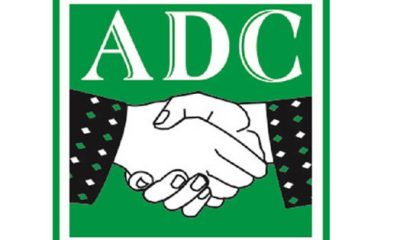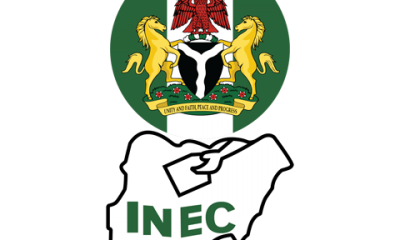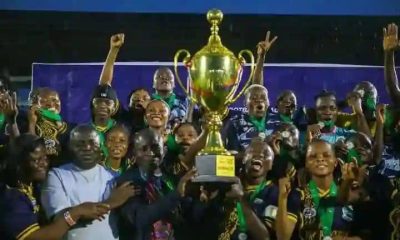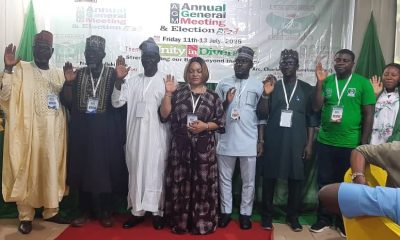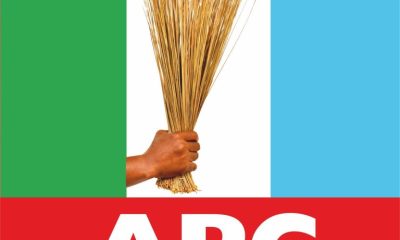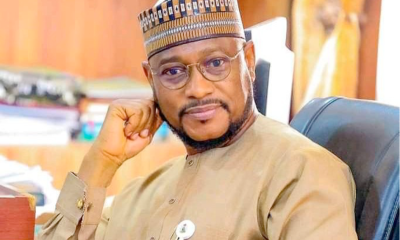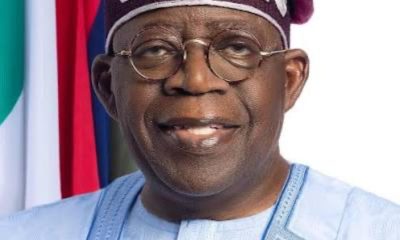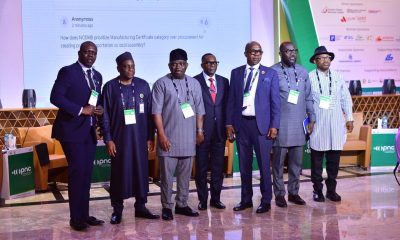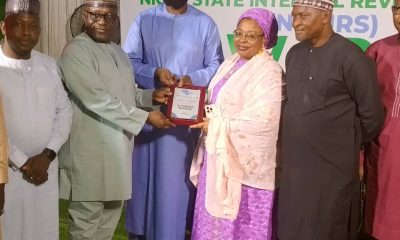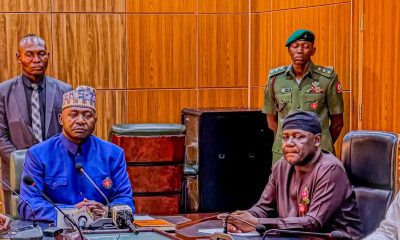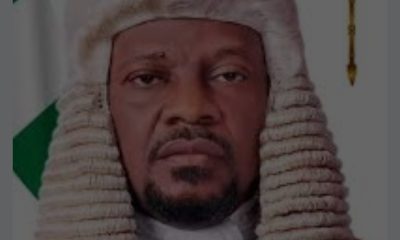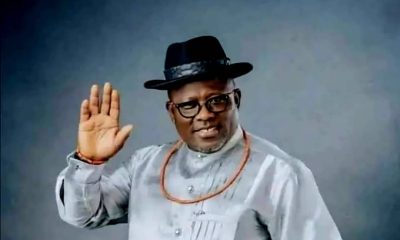Politics
Enugu: Edeoga makes U-turn,Dumps LP, Returns to PDP, lauds Mbah’s Leadership
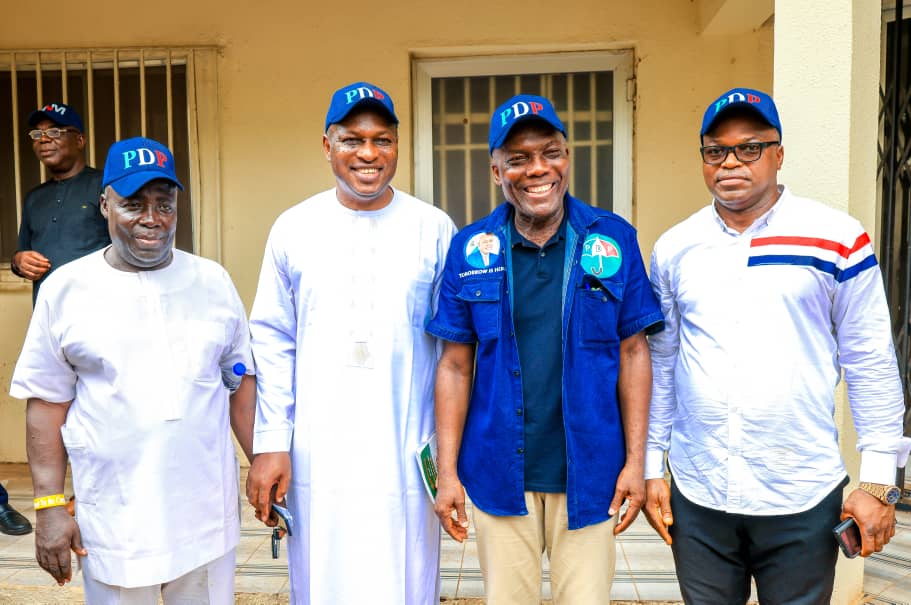
By Our Reporter
Ahead of 2027 governorship election, former candidate of the labour Party in 2023 election in Enugu state, Hon. Chijioke Edeoga, has left his party and returned to the Peoples Democratic Party, PDP.
It would be recalled that Edeoga met with the leadership of Enugu State PDP behind closed doors on January 31, which gave rise to speculations about his possible return to his former party.
However, at about 12 midday on Monday, Edeoga, accompanied by his supporters, drove into the PDP State office at No. 1 Charles Street, GRA, Enugu, in a convoy and was received by the state party leadership and stakeholders led by the Chairman, Dr. Martins Chukwunweike.
Speaking to party faithful, Edeoga thanked Governor Mbah and his Eha-Amufu Ward III, Isi-Uzo LGA, and state party leaderships for making his return possible and smooth.
Rededicating himself to the PDP, the former LP gubernatorial candidate, said it was time for all to join hands with Governor Mbah in the great works he is doing in Enugu State.
‘I want to say that I’m happy to be here. I want to start by thanking in a very special way, the governor of Enugu State. I appreciate that what has happened today cannot begun to be conceived without his political involvement.
“By this gesture, he has demonstrated a mental state that is worthy of appreciation and that is worthy of being supported or rewarded to the extent that is humanly possible.
“A thing like this has never happened in the annals of Enugu State politics. It might look small, but it will cause a paradigm shift in the way politics is played in Enugu State. It is no longer something where you warehouse bitterness. It is no longer winner takes all. All those things that people have been trying to preach in Nigeria like accommodating everybody, are being demonstrated in Enugu State.
“So, I rededicate myself again to the PDP to make sure that the PDP remains a winning machine in Enugu State as it has always been. I am happy to be here. I appreciate all those who made it possible,” he stated.
In his remarks, Dr. Chukwunweike described Edeoga’s return as strategic for Enugu PDP, and also had the full blessing of Governor Peter Mbah, whom he said, desired a united Enugu PDP.
“Our number one term of reference upon our election as the state’s party leadership is to reunite the party. His Excellency said that we must work to bring everybody together. So, today is a major step in that direction.
“With this move and many others like it to come, 2027 general elections will be a walkover for the PDP in Enugu State. So, we warmly welcome our brother and his supporters back,” he said.
Council Chairman of Isi-Uzo, Edeoga’s home LGA, Barr. Obiora Obeagu, described his return as a very welcome development and a milestone for Isi-Uzo and Enugu PDP, an affirmation of Mbah’s leadership, and vindication of those of them who worked for the governor’s victory in the 2023 election.
“It is a welcome development. For me, I will say it is long expected, considering the conciliatory dispositions of our capable governor.
“From day one, the governor has shown that after politics, we have governance. Not minding that the major opposition came from Isi-Uzo, Governor Peter Mbah started a lot of projects there. When the Smart Schools were first being awarded, Isi-Uzo got the next to the highest. That will show you the type of a leader he is.
“Beyond the Smart Green Schools, we have Type-2 Primary Healthcare Centres across all the wards. We have the almost completed 21.7km asphalt road going to our farm settlements as well as the ongoing 41km Owo-Ubahu-Amankanu-Neke-Ikem dual carriageway to help open up the economic corridors and solve the problem of insecurity.
“These things are practical and there is nobody that will see them and will not want to come back to the PDP and join the governor in the good works he is doing to transform Enugu State.
“So, what has happened today has vindicated some of us in Isi-Uzo that supported Mbah in 2023. We made our choices then and today Hon. Edeoga is also making that same choice. It is a welcome development. I believe we are all one now and we are all going to join Governor Mbah to work for the interest of Ndi Enugu,” he stated.
Politics
Rivers Assembly Speaker, 16 others dump PDP for APC
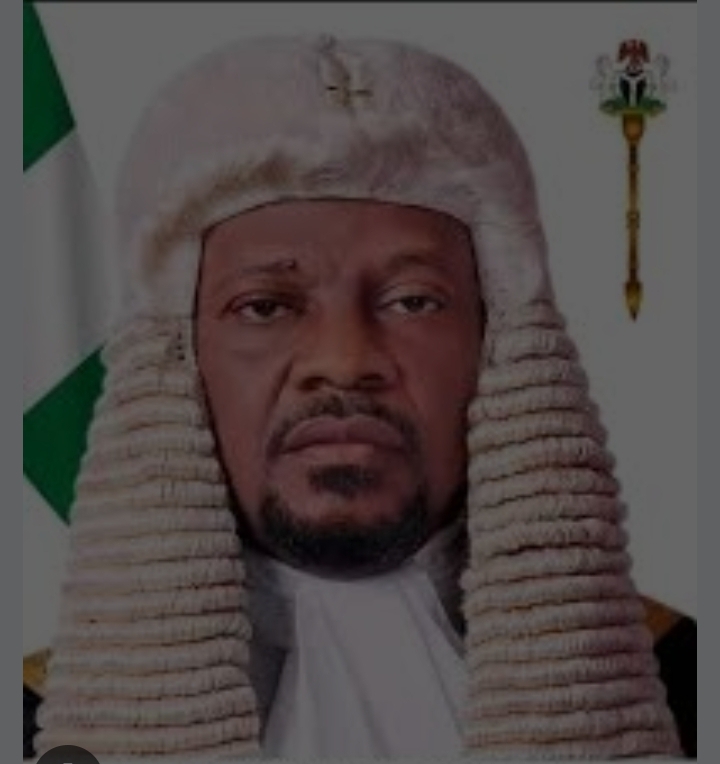
By Our Correspondent
Seventeen members of the 10th Rivers State House of Assembly, on Friday, defected from the Peoples Democratic Party (PDP) to the All Progressive Congress (APC).
The lawmakers announced their defection during plenary on Friday, December 5, 2025 at the Auditorium of the Assembly quarters currently used as the hallowed chambers.
The defected lawmakers, led by Speaker of the House, Martin Amaehwule, cited the division in the PDP at the national level as the reason for their defection, noting that the situation has made the future of the party “hazy and nebulous”.
Among the lawmakers who defected to the All Progressive Congress were; the Speaker, Martin Amaewhule, Deputy Speaker, Dumle Maol, Majority Leader, Major Jack, Deputy Majority Leader, Linda Somiari- Stewart, Chief Whip, Hon. Frankline Nwabuchi, and the Deputy Whip, Hon. Ofiks Kabang.
Others are; Hon. Peter Abbey, Smart Adoki, Igwe Aforji, Arnold Davids, Enemi George, Tekenari Granville, Christian Nwankwo, Gerald Oforji, Azeru Opara, Lolo Opuende, and Hon. Solomon Wami.
Recall that the Speaker, Martin Amaehwule had in December 2023, in the heat of the over two years political crisis in the state, led all 27 members of the Assembly loyal to the FCT Minister to the APC but later denied their defection, and returned to the PDP.
Meanwhile, the PDP which is now the minority party in the House with 9 members, has constituted their officers with Hon. Sylvanus Nwankwo emerging the Minority Leader, Hon. Barile Nwakoh was elected Deputy Minority Leader, Hon. John Dominic Iderima, Minority Whip, and Hon. Justina Emeji, Deputy Minority Whip.
The Assembly has also renewed its earlier call on the State Governor, Sir Siminalayi Fubara to forward his list of Commissioner-nominees to the House for screening and confirmation in line with the 1999 Constitution; regretting that “the State is yet to have the complement of a full cabinet.”
The Assembly also reaffirmed its earlier resolution made on the 14th of December, 2023, and adopted the auditorium at the State House of Assembly quarters as its legitimate and lawful Chamber for the conduct of legislative businesses for the life of the Tenth Assembly of the State.
Speaker of the Assembly, Martin Amaehwule in his speech lauded President Bola Tinubu for his purposeful and exceptional leadership and pledged their support to the APC and the President.
Politics
Sulu – Gambari , Ita Enang , Dambazzau , Ibas Ibok -Ete, 61 others make Tinubu’s Ambassadorial list
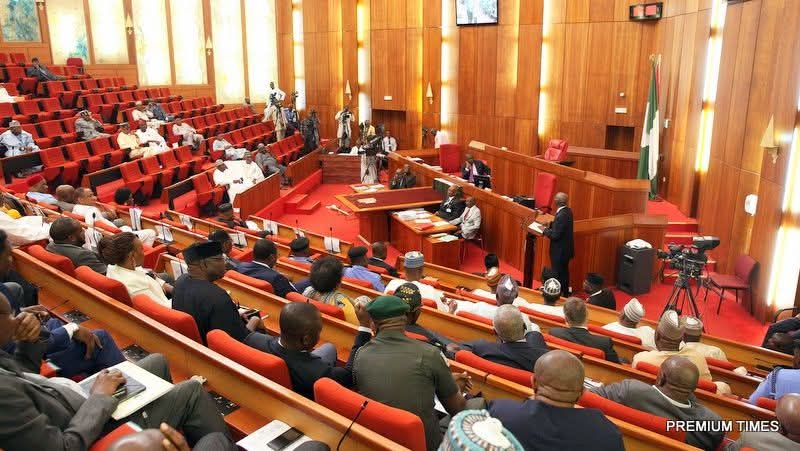
By George Mgbeleke
The Senate Thursday received requests for confirmation of nominations of 65 Ambassadorial nominees from President Bola Ahmed Tinubu.
The nominees as read from two different lists by the President of the Senate , Godswill Akpabio during plenary, fell into two categories of 34 Career Ambassadors and High Commissioners and 31 Non – Career Ambassadors and High Commissioners designate .
Notable names among the 34 Carrer Ambassadors and High Commissioners are Ambassador Sulu – Gambari Olatunji Ahmed from Kwara State , Ambassador Ahmed Mohammed Monguno from Borno State , Ambassador
Maimuna Ibrahim from Adamawa State etc .
Notable in the list of Non Career Ambassadors and High Commissioners are Senator Solomon Ita Enang from Akwa Ibom State , Vice Admiral Ibas Ibok – Ete from Cross River State , Ex Chief of Army Staff, Abdulrahaman Dambazzau from Kano etc .
President Tinubu in the requests hinged on section 171 sub section 1, 2 and 4 of the 1999 Constitution , sought for expeditious consideration of the nominees .
Accordingly, the President of the Senate, forwarded the requests to the committee on Foreign affairs for screening and report back within one week .
Recall that President Tinubu had earlier forwarded to the Senate , three ambassadorial nominees last week for appointment confirmation .
The three earlier nominees , namely
Kayode Are ( Ogun State), Aminu Dalhatu ( Jigawa) and Ayodele Oke ( Oyo State ), were screened on Wednesday by Senator Abubakar Sani Bello ( Niger North ) led committee .
Full list of the Ambassadorial nominees per state reads : ” Ambassador Ezenwa Chukwuemeka ( Abia ) Maimuna Ibrahim ( Adamawa ), Monica Ogochukwu ( Anambra) ,
Ambassador Mohammed Mahmoud Lele ( Bauchi) ,
Endoni Sindo ( Bayelsa) and Ambassador Ahmed Mohammed Minguno ( Borno ) .
Others are Jane Adams Okon Michael ( Cross River ), Clark Omeruo Alexandra ( Delta ), Chimma Geofrey Davies ( Ebonyi) ,
Oduma Yvonne Ehinose ( Edo State ), Wasa Segun Ige ( Edo State )
Ambassador Adeyemi Adebayo Emmanuel ( Ekiti ), Ambassador Onaga Ogechukwu Kingsley ( Enugu ) and
Magaji Umar ( Jigawa) .
Other nominees in the category of Career Ambassadors are
Mohammed Saidu Dahiru ( Kaduna ) ,
AbdulSalam Abus Zayat ( kano) ,
Shehu Barde ( Katsina ) , Aminu Nasiu ( Katsina ),
Abubakar Musa Musa ( Kebbi) ,Mohammed Idris ( Kebbi) ,
Bako Adamu Umar ( Kogi ) ,
Sulu Gambari Olatunji Ahmed ( Kwara ),
Ramata Mohammed ( Lagos ), Shaga John Shama ( Nasarawa )
Salau Hamza Mohammed ( Niger ) and Ibrahim Danlami ( Niger ) .
Others are
Adeola Ibrahim Mopelola ( Ogun) ,
Ruben Abimbola Samuel ( Ondo),
Akande Wahab Adekola ( Osun) ,
Adedokun Esther ( Oyo) ,
Gedagi Joseph John ( Plateau ) ,
Luther Obomode Ayokalata ( Rivers ),
Danladi Yakubu Yaku ( Taraba ) and
Bello Dogondaji ( ( Zamfara ) .
Names on the list of the 31 Non – career ambassadorial nominees are
Senator Grace Bent ( Adamawa ) , Senator Eta Enang ( Akwa – Ibom),
Nkechi Linda Okocha ( Anambra ),
Mahmud Yakubu ( Bauchi )
Philip K. Ikurusi ( Bayelsa ) ,
Paul Oga Adikwu ( Benue ),
Vice Admiral Ibok-Ette Ibas rtd ( Cross River ),
Hon. Abasi Braimah ( Edo ) and
Erelu Angela Adebayo Ekiti )
Others are Barrister Olumilua Oluwayimika Ayotunwa ( Ekiti ),
Rt. Hon. Ifeanyi Ugwuanyi ( Enugu State ) ,
Barr. Mrs. Chioma Ohakim ( Imo State ),
Lt. Gen. Abdulrahman Bello Dambazau (rtd.) ( Kano State ),
Hon. Tasiu Musa Maigari ( Katsina ) ,
Alhaji Abubakar Sanusi Aliyu ( Kogi) and
Olufemi Pedro ( Lagos State ) .
Others are
Barr. Mohammed Ubandoma Aliyu ( Nasarawa ),
Senator Jimoh Ibrahim ( Ondo), Ambassador Joseph Sola Iji ( Ondo ),
Fani-Kayode ( Osun ) , Professor O. Adewole ( Osun) , Florence Ajimobi ( Oyo ), Lola Akande ( Oyo), Professor Nora Ladi Daduut ( Plateau) , Yakubu N. Gambo ( Plateau ) , Chukwujinka Okocha ( Rivers ) , Haruna Abubakar ( Sokoto ) , Rt Hon Jerry Samuel Manwe ( Taraba ) and Adamu Garba Talba Nangree ( Yobe State ) .
Politics
Kano Guberpoll: Former LG chairmen adopt Sen Barau as APC’s sole candidate for 2027

By George Mgbeleke
Former local government chairmen in Kano State have adopted the Deputy President of the Senate, Senator Barau I. Jibrin, as the sole candidate of the All Progressives Congress (APC) for the 2027 governorship race in the state.
The former LG chairmen who served between 2019 and 2022, during the era of Dr Abdullahi Umar Ganduje as Governor of the state, adopted Senator Barau during a courtesy call to the National Assembly in Abuja on Wednesday.
A motion for the adoption of Senator Barau was moved by the former chairman of Rimin Gado Local Government Area, Barrister Dahiru Mannir Maigari, and seconded by the former chairman of the Association of Local Government of Nigeria (ALGON) in the state, Hon. Baffa Mohammed Takai.
When the former chairman of Madobi LGA, Alhaji Mohammed Yahaya, put the vote, all the former chairmen unanimously approved it through a voice vote.
Two members of the Kano State House of Assembly, Hon Zubairu Hamza Masu (Sumaila) and Hon Garba Yau Gwarmai (Tsanyawa/Ghari), witnessed the event.
A statement by the Special Adviser to the Deputy President of the Senate on Media and Publicity, Malam Ismail Mudashir, said that after the voice vote, the local government chairmen appealed to Senator Barau to declare for the governorship race as soon as possible.
Former chairman of Gwale LGA. Alhaji Khalid Ishak Diso informed the Deputy President of the Senate that the people of Kano, especially at the grassroots level, are eagerly awaiting his declaration for the race.
” Kano people are waiting for you to declare for the governorship race. We recently organised an event, where we asked you to declare. You are yet to. The people of Kano are anxiously awaiting your declaration. When are you declaring? Please answer the call to serve our people,” he said.
Also, the former Chairman of ALGON, Baffa Mohammed Takai, who led his colleagues on the courtesy call, said they adopted Senator Barau in view of his outstanding performance in parliament, adding that his contributions to Kano’s development are immense.
” We are here to throw our weight behind you. We are 100 per cent with you. Insha’Allah, you will be the next governor of Kano State, come May 29, 2027. You have the capacity to address the challenges facing our state,” he said.
Responding, the Deputy President of the Senate thanked the former local government chairmen for their support, describing them as grassroots politicians.
“It’s indeed true that Kano was second to Lagos before, in terms of development, in terms of commerce and so on. Unfortunately, Kano is now trailing behind due to a lack of good leadership. Let us not live in denial. This is a fact that we must all work together to address in the interest of our people and state.
“I wish to assure you that by the grace of God, we will take bold steps to bring Kano back to its glorious days. We will succeed by the grace of God. We will always stand by the truth and for our people,” he said.
* Tsanyawa, Ghari stakeholders endorse Barau
Meanwhile, stakeholders from Tsanyawa and Ghari LGAs of Kano State have also thrown their weight behind Senator Barau’s candidature during their visit to him on Wednesday.
A member of the Kano State House of Assembly, Hon. Garba Yau Gwarmai, representing Tsanyawa/Ghari, moved the motion, which Hon. Aminu Yakanawa seconded. A thunderous ovation from over 100 stakeholders in attendance followed the announcement of the endorsement.
Yakanawa told the Deputy President of the Senate that the people of the two local government areas are solidly behind him.
” By the grace of Allah SWT, you are the next governor of Kano State. Our people are solidly behind you, and we are committed to supporting you,” he said
Responding, Senator Barau thanked them for the support, saying the massive support from all the people of the state is a signal of what will happen in 2027.
On the security challenges facing some parts of Tsanyawa and Shanono LGAs, he said, ” We are not leaving any stone unturned in tackling this challenge. We are working underground to bring an end to it. We have taken all the necessary steps. It is not something that we go to radio stations to announce.”
-

 Business & Economy4 months ago
Business & Economy4 months agoPC-NCG Issues Disclaimer on Purported Nigerian Coast Guard National Orientation Exercise In Anambra State
-

 Entertainment1 year ago
Entertainment1 year agoJubilation galore as Parishioners of CKC Kurudu celebrate their cultural heritage ….FG should exploit our Cultural heritage to unite Nigerians-Rev Fr Dim
-

 Law & Crime6 months ago
Law & Crime6 months agoICPC pledges to collaborate with FIDA to end Sex for Marks in tertiary institutions
-

 General News1 year ago
General News1 year agoCelebration galore as UDA Successfully Elected New Exco ……I will digitalize processes that will raise UDA to greater height -Comr. Okejiri
-

 General News2 years ago
General News2 years agoReps hold public hearing on FMC Ugwuaji Awkunanaw
-

 Law & Crime5 months ago
Law & Crime5 months agoLegal practitioner raises alarm over threat to his life by CSP Muhammed Abdulkareem
-

 General News1 year ago
General News1 year agoKugbo Hill Tragedy: Trailer Crushes Car, Kills Four and Injures Several Others in Abuja
-

 Politics3 months ago
Politics3 months agoASUU-NDU protest against FG loans, unpaid salaries,Non-Implementation of agreements …..says loans is generational slavery

